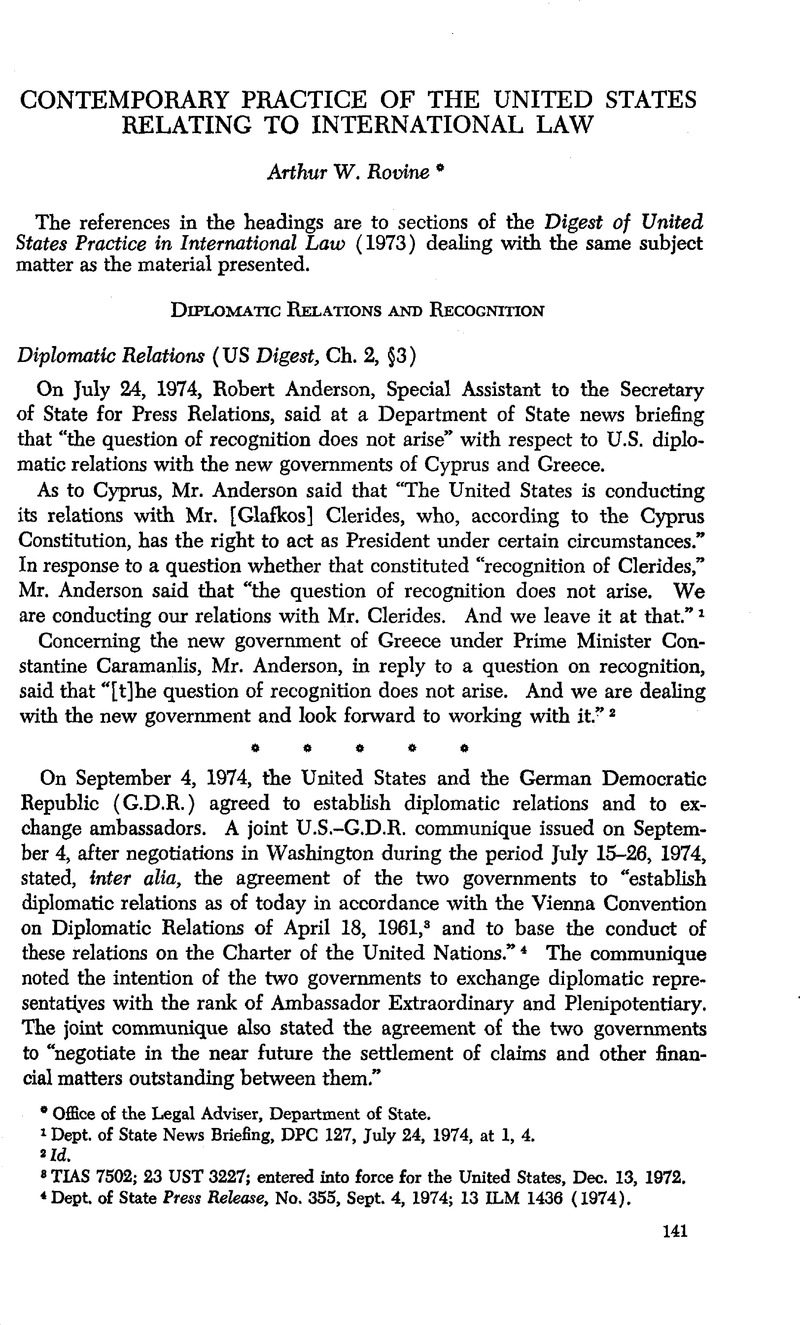No CrossRef data available.
Published online by Cambridge University Press: 28 March 2017

1 Dept. of State News Briefing, DPC 127, July 24, 1974, at 1, 4.
2 Id.
3 TIAS 7502; 23 UST 3227; entered into force for the United States, Dec. 13, 1972.
4 Dept. of State Press Release, No. 355, Sept. 4, 1974; 13 ILM 1436 (1974).
1 39 Fed. Reg. 26153–54 (1974).
2 For the Dept. of State’s notice of proposed rulemaking, see id., at 18792.
1 Hearings before the House Comm. on Foreign Affairs, 93d Cong., 2d Sess., June 13, 1974.
2 Department of State File No. P74 0084–0180; 120 Cong. Rec. H6688-89 (daily ed. July 17, 1974).
1 Art. 27 of the Convention provides in part:
1. The receiving State shall permit and protect free communication on the part of the mission for all official purposes. In communicating with the Government and the other missions and consulates of the sending State, wherever situated, the mission may employ all appropriate means, including diplomatic couriers and messages in code or cipher. However, the mission may install and use a wireless transmitter only with the consent of the receiving State.
2. The official correspondence of the mission shall be inviolable. Official correspondence means all correspondence relating to the mission and its functions.
3. The diplomatic bag shall not be opened or detained.
4. The packages constituting the diplomatic bag must bear visible external marks of their character and may contain only diplomatic documents or articles intended for official use.
2 UN reference C.N.137.1969. Tbeattes-4, Aug. 12, 1969.
3 UN reference C.N.178.1971. Teeaties-10, Dec. 1, 1971.
4 UN reference C.N.141.1971. Tbeaties-3, July 25, 1974. All three documents can be found in Dept. of State File No. POL 17.
1 TIAS 7502; 23 UST 3227; 63 AJIL 875 (1969); entered into force for the United States, Dec. 13, 1972.
2 Dept. of State File No. P74 0074-1275.
1 Dept. of State Press Release, No. 355, Sept. 4, 1974; 13 ILM 1436 (1974).
1 Hague Convention for the Suppression of Unlawful Seizure of Aircraft, TIAS 7192; 22 UST 1641; 65 AJIL 440 (1971); 10 ILM 133 (1971); entered into force for the United States, Oct. 14, 1971.
2 Also in 13 ILM 1515 (1974).
1 Art. 20 of the Convention on the Territorial Sea and the Contiguous Zone provides:
1. The coastal State should not stop or divert a foreign ship passing through the territorial sea for the purpose of exercising civil jurisdiction in relation to a person on board the ship.
2. The coastal State may not levy execution against or arrest the ship for the purpose of any civil proceedings, save only in respect of obligations or liabilities assumed or incurred by the ship itself in the course or for the purpose of its voyage through the waters of the coastal State.
3. The provisions of the previous paragraph are without prejudice to the right of the coastal State, in accordance with its laws, to levy execution against or to arrest, for the purpose of any civil proceedings, a foreign ship lying in the territorial sea, or passing through the territorial sea after leaving internal waters.
2 Art. 9 of the Convention on the High Seas provides:
Ships owned or operated by a State and used only on government non-commercial service shall, on the high seas, have complete immunity from the jurisdiction of any State other than the flag State.
3 UN reference C.N.272.1973. Treaties-6, Feb. 8, 1974.
4 Dept. of State Files Nos. F74 0010-1578; P74 0069-1521.
1 13 ILM 1292 (1974).
2 Ibid. Also Dept. of State File No. P74 0097-2918.
3 TIAS 5578; 15 UST 471; 499 UNTS 311; 52 AJIL 858 (1958). new claim.”4
4 Dept. of State Press Release No. 363, Sept. 12, 1974.
5 Dept. of State File No. P74 0103-1509.
6 Dept. of State File No. P74 0097-2256.
1 Also in 13 ILM 1521 (1974).
2 See H.R. Reft. No. 93-1026, 93d Cong., 2d Sess., May 2, 1974; S. Rept. No. 93-676, 93d Cong., 2d Sess., Feb. 5, 1974; H.R. Rept. (Conference Rept.) No. 93-1233, 93d Cong., 2d Sess., July 30, 1974; OPIC Press Release TS/295, Aug. 28, 1974.
1 Cong. Rec. S14425 (daily ed., Aug. 7, 1974).
1 See 120 Cong. Rec. H7651 and H7673 (daily ed., Aug. 5, 1974). For the official texts (French and English) of the Geneva Protocol, see 94 LNTS 65 (1929).